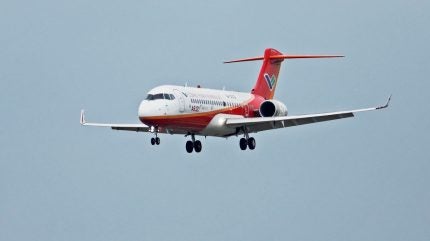
Chinese biofuel company Jiaao Enprotech sold a 15% stake in its sustainable aviation fuel (SAF) unit to BP for $49.56m.
Zhejiang Jiaao Enprotech, a Chinese biofuel company, announced that its unit producing SAF has reached an investment agreement with BP to help reduce carbon emissions from air transportation.
BP has acquired a 15% stake in Lianyungang Jiaao Enproenergy by investing 354 million yuan ($49.56 million).
Reuters reported that the Chinese company, located in the eastern coastal city of Lianyungang, is currently constructing a SAF plant with a capacity of 500,000 tons per year. The construction will be completed early next year.
According to Reuters, Jiaao made public the investment agreement with BP on its WeChat account on Thursday evening.
The company is among the largest biodiesel manufacturers in China and serves customers such as Shell, Exxon Mobil, and TotalEnergies.
According to research from Offshore Technology’s parent company, GlobalData, the global SAF production capacity is expected to see a “remarkable growth during the period 2020-2030 and will reach 6,206 million gallons per annum (mmgy) in 2030.”
It added that a slew of projects mainly planned in North America, Europe, and Asia are expected to drive this exceptional capacity growth by 2030.
SAF is considered an environmentally friendly energy source and relatively pure compared to conventional jet fuel. It is rapidly gaining prominence globally, with most production planned through standalone renewable refineries.
Investment research firm Zacks Equity Research highlighted that the BP deal is the first cooperation between a Chinese SAF unit and a major international oil company.
This partnership is anticipated to speed up the development of China’s eco-friendly aviation industry and aid in global initiatives to minimise carbon emissions from air transportation.
China, the world’s second-largest aviation market, uses about 11% of the global jet fuel supply.
According to Reuters, China is expected to reveal its overall SAF policy aims for 2030 this year, which could lead to substantial investments of billions of dollars.
China does not produce SAF commercially for domestic purposes, but companies in the biofuel industry are investing over $1bn in building plants that will convert waste cooking oil into aviation fuel for export.
China’s recent SAF policy aligns with the nation’s goal of reaching carbon neutrality by 2060. According to the think tank Modern Diplomacy (MD), the Civil Aviation Administration of China (CAAC) stated last year that the policy seeks to lower carbon emissions per unit of aviation fuel, improve energy independence, and establish China as a frontrunner in the international SAF market.
The CAAC in Chengdu established the first technical centre for SAF in China last month. Reuters said the centre will focus on standard setting, product research, industry policy development, and quality control standards.



